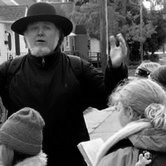 |
|
||||
Mark Wagler writes…
In the early 70’s, when I first felt the call of oral stories, I imagined being a traveling storyteller, a minstrel performing for new audiences in new places. After telling stories, teaching storytelling, and directing story collecting projects in more than 700 schools and at hundreds of museums, universities, festivals, libraries, historical societies, conferences, and other learning environments, I got tired of living on the road. I realized that many of my stories focused on a deep sense of community, and hungered to stay at home. In teacher workshops, I talked about deep applications of storytelling in all aspects of the curriculum, but didn’t get the opportunity to live out my theories.
When I returned to classroom teaching in the late 80’s, I began to image the curriculum as a story. I had no intention of telling stories all day long, but instead wanted to structure the classroom with the elements of storytelling. As a folklorist, I had recorded and studied many traditional storytellers, and read what other folklorists had to say about traditional narratives and tellers.
I knew that traditional storytelling is improvised around traditional images, and already felt confident in improvising my instruction. But did improvisation have anything to do with learning, and with the experience of being a student? I pushed the metaphor to include problem solving and inquiry. Stories, of course, are about characters solving problems. I began to give my student learning experiences in which they solved complex real-world problems. I helped my students create science investigations based on their own questions. Extended inquiry projects became the highlight of the school year.
Gradually I built up a theory of narrative pedagogy, and a set of teaching practices that helped students experience their lives and the world around them as a story. Imagery, repetition, dialogue, boundaries, body awareness, and community now shaped my classroom as they once had shaped my storytelling. Our explorations of local ecosystems and neighborhoods yielded a constant stream of stories. And stories were equally important in our study of algebra, journal writing, and media productions.
Bio
Mark Wagler grew up in a large Amish-Mennonite farm family in Ohio. He studied cultural history in graduate school at the Universität Bern in Switzerland, the history of science and Renaissance/Reformation at the University of Chicago, and received an M.A. in theatre at the University of Wisconsin.
As a free-lance storyteller and folklorist, Mark conducted long term educational projects with the Museum of the Wisconsin Historical Society, Wisconsin Department of Public Instruction, Wisconsin Public Radio, Kohler Art Center in Sheboygan, the Center for the Study of Upper Midwestern Cultures at the University of Wisconsin-Madison, and directed two year-long teacher-training programs with UW-Madison and the Madison school district on storytelling in the language arts and social studies. He was the first president of the Northlands Storytelling Network and co-director of Heads & Tales, an international conference on storytelling in education.
Until recently, Mark taught a multiage fourth and fifth grade classroom at Randall School in Madison, Wisconsin. As a co-founder of the Heron Network, the Heron Institute, and Great Blue: A Journal of Student Inquiry, he helped provide training and organize collaboration among teachers who emphasize equity, inquiry, local study, and networking in their classrooms. His students regularly observed nature in an outdoor classroom he helped establish at his school and on biweekly “Mornings-in-the-Marsh” at nearby Lake Wingra.
In recent years, his students have taken culture tours of their county, nearby neighborhoods, and seven Hmong communities throughout Wisconsin. Students presented the results of their inquiries via student journals and conferences, museum exhibits, a book, videos, web sites, and local and global classroom networks. He has published articles and book chapters and presented many workshops and keynote addresses based on his teaching, storytelling, and fieldwork. Among numerous academic and teaching awards he has received are a Woodrow Wilson Fellowship, the Dorothy Howard Prize in Folklife Education from the American Folklore Society, and a Presidential Award for Excellence in Teaching Mathematics and Science.
Mark is now program manager of the Local Games Lab at the University of Wisconsin, where he helps create augmented reality games about local places, support teachers who use these games in their classrooms, and research student learning. Although place-based games are a new media for Mark, their NPCs, roles, and challenges feel very familiar to Mark. He is still teaching with stories.
A few web sites:
Park Street Cultural Tour: http://csumc.wisc.edu/cmct/ParkStreetCT/index.htm
Vodcast stories from the Greenbush Cultural Tour: http://csumc.wisc.edu/MediaLib/podcast/index.htm
Local Games Lab: http://www.lgl.gameslearningsociety.org/

#1 by Tim on December 14, 2007 - 6:21 pm
Quote
Thank you for bringing Mark on the show. I was not famiiiar with his work, and his integration of his knowedge of storytelling into the classroom is fascinating. Obviously, as you both mentioned in the interview, what he knows about narrative pedagogy can’t fit into an hour.
So I hope you schedule him for a dozen more.
And I for one would love to hear him speak on his current work on place-based stories and games.